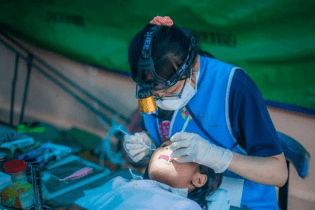Prophylactic antibiotic use in Dentistry
Is it beneficial and recommended to perform a prophylactic antibiotic treatment prior to a dental surgery, such as tooth extractions or implants, in order to prevent post-surgical infections? This question is still widely debated within in the dental practice and yet no clear answer is available.
Nowadays, due to the frequent and overuse of antimicrobial agents in relation to different types of infections, antimicrobial resistance has become a predominant medical problem. As it has to be preserved that widespread resistance continues to develop at a rapid pace, the prophylactic use of antibiotics should be used with caution and would need a proof for being able to prevent postsurgical infections in dental patients for being accepted.

No clear evidence
Different studies have shown that there is no clear evidence for beneficial outcome and that the risk of infection would be minimal even without previous treatment. On the contrary, other studies have indicated that the negative effects caused by antibiotics could be more detrimental than their positive effects in this situation. Evidently, these drugs have the ability to kill protective bacteria within the human organism for several months. During this time period, the patient becomes more vulnerable to secondary infections, such as infections by Clostridium difficile, which can cause symptoms like diarrhea, nausea, fever and pain.

A different study highlighted another potential problem in relation with the antibiotic usefulness as a prophylactic agent. High evidence was found that the way of prescribing pre-treatment antimicrobial agents is frequently inconsistent with the official guidelines and recommendations. Additionally, it was mentioned that there might be more important factors regarding post-surgical infections such as the dentist’s experience and the duration of the surgery.
How are we prescribing?
Considering all studies taken into account, clear evidence still has to be provided in regard to the beneficial use of antibiotics as prophylaxis against infections following dental surgery. There are some problems related with the agents themselves but also problems related to the prescription handling, for instance, wrong administration of antibiotics. Consequently, these problems are the product of doctor prescribing the wrong drugs and the non-compliant behavior of the patient, who might not follow the proper administering instructions with the correct drug. Thus, it might be an appropriate strategy to create better guidelines and provide clearer information to both the patient and the dentist. Furthermore, studies about the effectiveness needs to be done for cases in which an acute inflammatory infection is already present, but the surgical intervention is still necessary, as this hasn’t been assessed adequately.

The bottom line…
In conclusion, when a prescription of prophylactic antibiotics is considered, it should be carried out carefully and followed the official guidelines for the appropriate usage. A clear, written instructions should also be given to the patient for taking a certain drug. Currently, there is still no clear evidence regarding the beneficial effect towards the presurgical treatment. Hence, antibiotics should only be prescribed if it is absolutely necessary and benefits the patient more than it does harm.

This post was written by Anna-Maria Stoth, Felicidas Lehmann, Kim-Hau Lui and Robin Laques, all of them 2nd Year Dentistry Students in Microbiology and Virology. Good Job!












